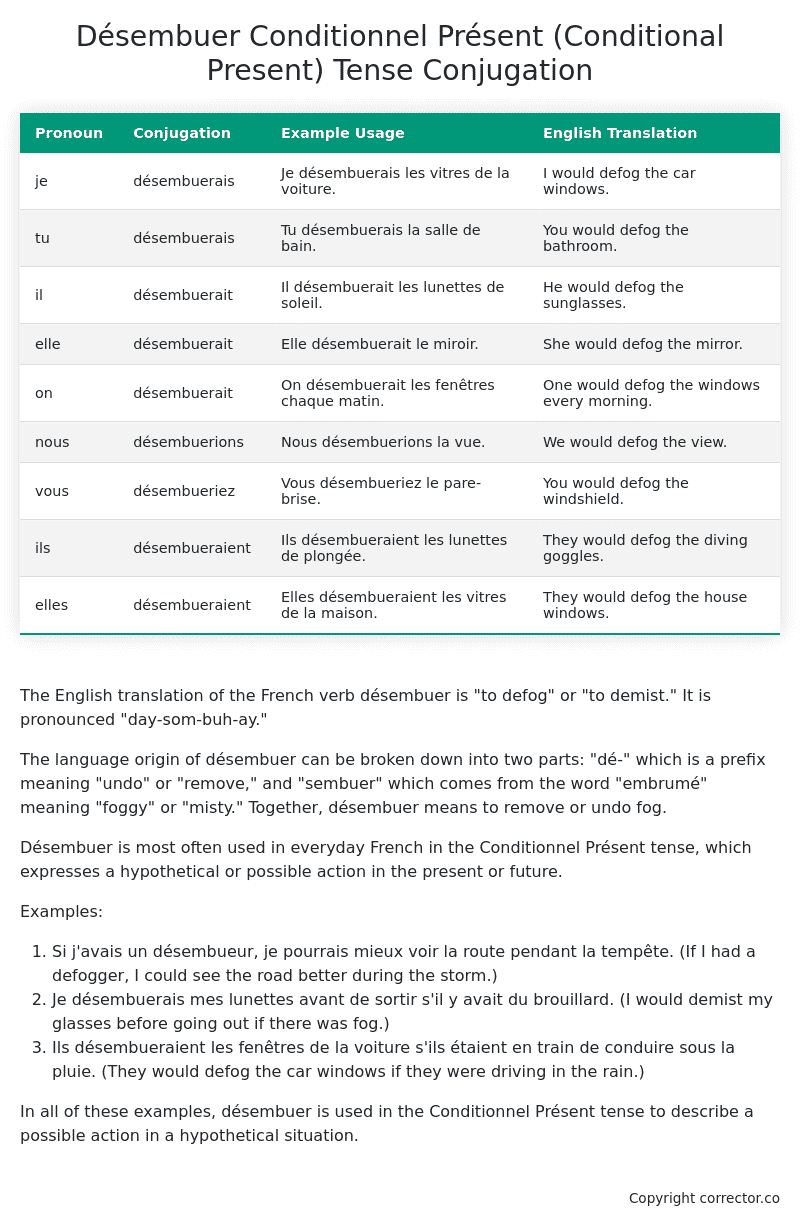Conditionnel Présent (Conditional Present) Tense Conjugation of the French Verb désembuer
Introduction to the verb désembuer
The English translation of the French verb désembuer is “to defog” or “to demist.” It is pronounced “day-som-buh-ay.”
The language origin of désembuer can be broken down into two parts: “dé-” which is a prefix meaning “undo” or “remove,” and “sembuer” which comes from the word “embrumé” meaning “foggy” or “misty.” Together, désembuer means to remove or undo fog.
Désembuer is most often used in everyday French in the Conditionnel Présent tense, which expresses a hypothetical or possible action in the present or future.
Examples:
- Si j’avais un désembueur, je pourrais mieux voir la route pendant la tempête. (If I had a defogger, I could see the road better during the storm.)
- Je désembuerais mes lunettes avant de sortir s’il y avait du brouillard. (I would demist my glasses before going out if there was fog.)
- Ils désembueraient les fenêtres de la voiture s’ils étaient en train de conduire sous la pluie. (They would defog the car windows if they were driving in the rain.)
In all of these examples, désembuer is used in the Conditionnel Présent tense to describe a possible action in a hypothetical situation.
Table of the Conditionnel Présent (Conditional Present) Tense Conjugation of désembuer
| Pronoun | Conjugation | Example Usage | English Translation |
|---|---|---|---|
| je | désembuerais | Je désembuerais les vitres de la voiture. | I would defog the car windows. |
| tu | désembuerais | Tu désembuerais la salle de bain. | You would defog the bathroom. |
| il | désembuerait | Il désembuerait les lunettes de soleil. | He would defog the sunglasses. |
| elle | désembuerait | Elle désembuerait le miroir. | She would defog the mirror. |
| on | désembuerait | On désembuerait les fenêtres chaque matin. | One would defog the windows every morning. |
| nous | désembuerions | Nous désembuerions la vue. | We would defog the view. |
| vous | désembueriez | Vous désembueriez le pare-brise. | You would defog the windshield. |
| ils | désembueraient | Ils désembueraient les lunettes de plongée. | They would defog the diving goggles. |
| elles | désembueraient | Elles désembueraient les vitres de la maison. | They would defog the house windows. |
Other Conjugations for Désembuer.
Le Present (Present Tense) Conjugation of the French Verb désembuer
Imparfait (Imperfect) Tense Conjugation of the French Verb désembuer
Passé Simple (Simple Past) Tense Conjugation of the French Verb désembuer
Passé Composé (Present Perfect) Tense Conjugation of the French Verb désembuer
Futur Simple (Simple Future) Tense Conjugation of the French Verb désembuer
Futur Proche (Near Future) Tense Conjugation of the French Verb désembuer
Plus-que-parfait (Pluperfect) Tense Conjugation of the French Verb désembuer
Passé Antérieur (Past Anterior) Tense Conjugation of the French Verb désembuer
Futur Antérieur (Future Anterior) Tense Conjugation of the French Verb désembuer
Subjonctif Présent (Subjunctive Present) Tense Conjugation of the French Verb désembuer
Subjonctif Passé (Subjunctive Past) Tense Conjugation of the French Verb désembuer
Subjonctif Imparfait (Subjunctive Imperfect) Tense Conjugation of the French Verb désembuer
Subjonctif Plus-que-parfait (Subjunctive Pluperfect) Tense Conjugation of the French Verb désembuer
Conditionnel Présent (Conditional Present) Tense Conjugation of the French Verb désembuer (this article)
Conditionnel Passé (Conditional Past) Tense Conjugation of the French Verb désembuer
L’impératif Présent (Imperative Present) Tense Conjugation of the French Verb désembuer
L’infinitif Présent (Infinitive Present) Tense Conjugation of the French Verb désembuer
Struggling with French verbs or the language in general? Why not use our free French Grammar Checker – no registration required!
Get a FREE Download Study Sheet of this Conjugation 🔥
Simply right click the image below, click “save image” and get your free reference for the désembuer Conditionnel Présent tense conjugation!

Désembuer – About the French Conditionnel Présent (Conditional Present) Tense
Formation
Common Everyday Usage Patterns
Expressing Polite Requests
Expressing Hypothetical Situations
Expressing Doubt or Uncertainty
Interactions with Other Tenses
Present Tense
Past Tense
Future Tense
Conditional Perfect
Summary
Want More?
I hope you enjoyed this article on the verb désembuer. Still in a learning mood? Check out another TOTALLY random French verb conjugation!


